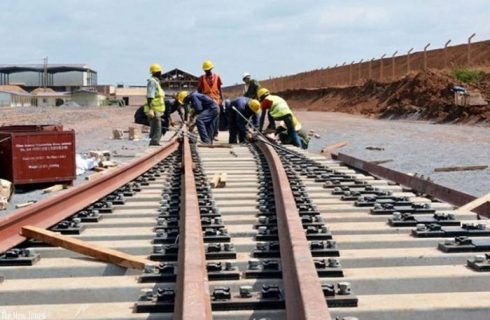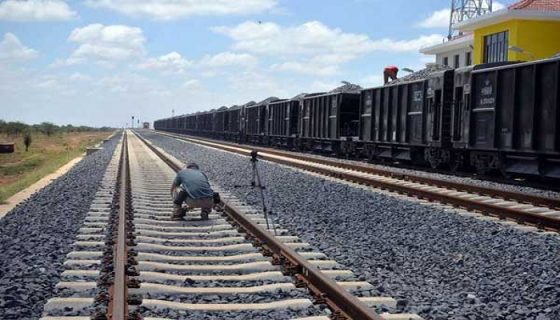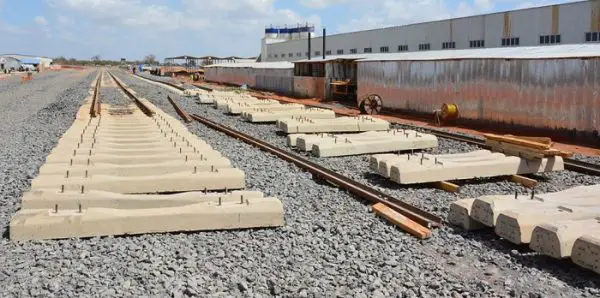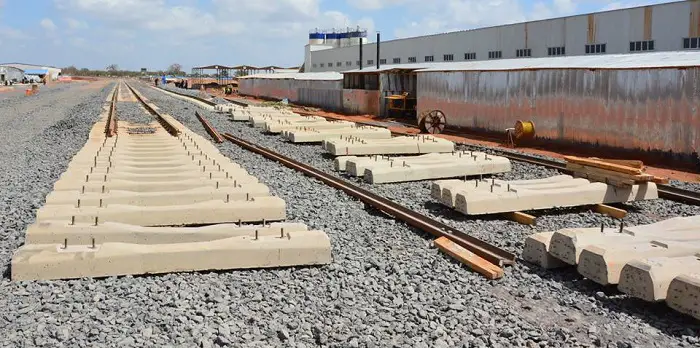The government of Tanzania has announced plans to invite international tenders for the construction of the Isaka-Kigali standard gauge railway that starts from Isaka dry port to neighbouring countries of Rwanda and the Democratic Republic of Congo (DRC).
Hassan Abbasi, chief government spokesperson and permanent secretary for the Ministry of Information, Culture, Arts and Sports revealed the plans and said that the government is in its final touches of negotiations.
“Tenders for the construction of the SGR project to Rwanda and DRC will be announced anytime from now, President John Magufuli had already given directives on the construction of the Mwanza-Isaka SGR that will connect to the two neighbouring countries,” said Hassan Abbasi.
Also Read: Tanzania secures US $1.5bn loan for 550km of its SGR project
Tanzania SGR project
The chief government spokesperson also confirmed that feasibility studies for the SGR linking Tanzania and Rwanda have already been undertaken, adding that the two countries were now looking for financiers for the project. The rail link project is part of a US $14.2bn plan to build around 2,500km of standard gauge rail lines in the country over the next five years.
It is intended to reduce road congestion and decrease freight costs by 40%. Each freight train is expected to transport up to 10,000 tonnes, equivalent to 500 lorry loads. It will also connect Tanzania to Burundi and Uganda, making it an important enabler of regional integration.
Tanzania will become the third country in East Africa to start enjoying modern railway services after Kenya and Ethiopia. Kenya was the first country in the region to start the construction of an SGR line, completing over 500km between Mombasa and Nairobi, and also inaugurating its passenger services in June 2017.
Reported earlier
April 2014
US$ 5.1Billion Dar es Salaam – Isaka railway upgrade project in the offing
The Dar es Salaam – Isaka railway upgrade project in Tanzania which is part of a larger plan to link Dar es Salaam with Kigali in Rwanda and Gitega in Burundi is now set to begin. This follows an approval of the allocation of US$ 300 million from the World Bank.
Tanzania’s Transport Minister Mr. Omari Nundu confirmed this and gave options of how the upgrade process might be conducted. He pointed out that one of them is the construction of a new parallel standard-gauge railway via the planned port at Bagamoyo at a cost of US$ 2.47 billion or upgrading the existing line to standard gauge at a cost of US$ 912.1 million and while to dual gauge it will cost $US 996 million. All these options will be discussed fully before commencing.
The project will take three to four years for it to be completed and this will see Tanzania’s transport competence upgraded and will also act as a competitive substitute to road transport.
May 2016
Rwanda opts for the Tanzania route on the SGR construction project

Rwanda has announced that it has opted to take the Tanzania route in regards to the SGR construction project and do away with the Kenyan route arguing that it is cheaper and will take less time; this is according to Claver Gatete, the Minister of Finance and Economic Planning.
The Rwandan government plans to develop the rail link to Indian Ocean ports through Tanzania since they are cheaper and shorter than the Kenyan route, Mr Gatete said.
Initially, in 2013, Rwanda, Kenya and Uganda had agreed to link up to the Mombasa port along a standard-gauge railway estimated to cost a massive US$ 13bn but the East Africa Community member states have realized that the Tanzanian option will cost Rwanda approximately US$ 800m to US$ 900m while the Kenyan route would cost Rwanda a whopping US$ 1bn.
“We have decided on using the route transiting to Tanzania during the construction of our railway line because the Kenyan route would be expensive costing US$ 1bn and time-consuming,” said Mr Gatete.
To confirm the reports, Jules Ndenga, acting special project implementation unit coordinator at the ministry of infrastructure in Rwanda said Tanzania and Rwanda had already held a joint technical monitoring committee meeting to fast-track the railway project.
“We are conducting a joint development of the standard gauge railway with our counterparts from Burundi and Tanzania. We have already agreed on the terms and conditions for the venture and the Rwanda Transport Development Agency will procure the final agreement on behalf of the three countries,” Mr Ndenga pointed out.
The SGR project is projected to be completed in March 2018 and constructed by China Roads and Bridges Corporation (CRBC).
The Governments of Kenya, Uganda, Rwanda and South Sudan are committed to providing a high capacity and cost-effective railway transport within the Northern Corridor. The railway line will be of Standard Gauge technology and will have an identical design specification that will allow for seamless operations across the borders of the countries with each country responsible for the construction of the section that lies within its boundaries.
Jan 2018
Tanzania and Rwanda plan to construct a Standard Gauge Railway

Tanzania and Rwanda have agreed to construct a Standard Gauge Railway (SGR) network connecting Isaka in Shinyanga to Kigali, with the key goal of linking the landlocked country to the port of Dar es Salaam. President John Magufuli revealed the agreement yesterday after his talks with the visiting Rwanda President Paul Kagame at the State House in Dar es Salaam. President Kagame was in the country for a one-day state visit.
The 400-kilometre track is meant to boost trade between Tanzania and Rwanda as part of the central railway network that runs from the port of Dar es Salaam.
“I do direct the ministers responsible for infrastructure from Tanzania and Rwanda to meet in two weeks’ time to deliberate on the costs of implementing the project,” Dr Magufuli remarked.
Also read: Kenya and Tanzania agree to construct two link roads
He further revealed that the design and feasibility study for the mega project had been finalized; stating that the railway network will haul cargo to Burundi and the Democratic Republic of Congo (DRC).
At present, Tanzania has initiated the construction of the railway network on a standard gauge measuring over 700km from Dar es Salaam to Makutopora in Dodoma.
Dr Magufuli was unhappy that trade between Dar es Salaam and Kigali is decreasing, citing statistics from last year which showed that shipment destined to Rwanda from the port of Dar es Salaam was just 950,000 tonnes as of last year.
The Head of State revealed further that the trade balance between the two countries had been fluctuating since 2011. During the financial year, 2011, the trade balance between Tanzania and Rwanda stood at US $47.7m but the amount decreased to US $12.2m in 2012. It grew to US $59.2m in 2013 and again plummeted to US $28.8m in 2014.
Speaking at the occasion, President Kagame assured Dr Magufuli that his country was committed to conducting business with Tanzania for the well-being of people from the two countries and the East African region as a whole.
February 2018
Rwanda and Tanzania meet over Isaka-Kigali SGR financing
Rwanda and Tanzania finance ministers on Monday met in Dar es Salaam, Tanzania, to consider the finance matters regarding accomplishment of the two countries’ joint 521 km Isaka-Kigali SGR (Standard Gauge Railway) project. The project is estimated to cost US $2.5bn.
The Rwandan Minister for Finance and Economic Planning, Amb. Claver Gatete and his delegation including the Permanent Secretary and Secretary to the Treasury, Caleb Rwamuganza, met with his Tanzanian counterpart, Dr. Philip Mpango and his team as a follow up to the meeting held January 20th by the countries’ Ministers for Infrastructure on the same project.
According to Gatete, it is all work in progress and they continue to look at matters such as structure of financing, possible partnerships, and the progress of the project.
“We are on the right track as our meeting was a follow up to that held recently by the ministers for infrastructure of Rwanda and Tanzania in Dar es Salaam. We shall continue to discuss the possible options, including partnership with the private sector and any other partners,” said Gatete.
Sources say, the latest meeting, among others, the delegates agreed that some critical issues including feasibility studies impacting on cost be re-examined so that both countries have a clearer picture on the financial implications before charting the way forward as regards mobilizing funds.
The project’s estimated total cost of US $2.5bn was made in 2015 and it is possible that there could be changes that need to be well factored in considering inflation and other economic factors.
Rwanda and Tanzania agreed on joint construction of the SGR from Isaka (northwestern Tanzania) to Kigali, to facilitate movement of goods and services, following a meeting between Presidents Paul Kagame and John Pombe Magufuli, during the former’s one-day working visit to Dar-es-Salaam, mid-January.
Nearly 80 per cent of Rwanda’s imports and exports go through Tanzania.
When Ministers for Infrastructure met in Dar es Salaam, on January 20th to consider implementation of the joint project they, among others, adopted feasibility studies already conducted in the two countries, agreed that the foundation stone be laid by October, and the two countries jointly mobilizing funds for construction of the joint project with each country meeting the cost of infrastructure in its own territory.
Gatete reiterated that appropriate efforts are being put in to fast-track things such that the foundation stone is laid before year end.
Earlier, the Ministers for Infrastructure adopted the proposed timeline towards implementation of the Presidents’ directives so as to lay the foundation stone by October, 2018.
Officials in both countries say the project is crucial as, once realized, it will reduce transport costs, foster physical integration of transport modes, economic growth and improved social services in the sub region, among others.
March 2018
Rwanda, Tanzania to Review Isaka-Kigali Standard Gauge Railway Design

Rwanda and Tanzania have agreed to review the design of the Isaka-Kigali standard gauge railway. The two countries have dropped the proposed use of diesel engines in favour of electric locomotives. According to experts, electric trains are more efficient and environmentally friendly as opposed to diesel trains.
Rwanda’s Minister of State in charge of Transport, Jean de Dieu Uwihanganye, and Prof. Makame M. Mbarawa, the Minister for Works, Transport and Communication of Tanzania, signed yet another agreement leading to the implementation phase of the project.
However, the proposed time frame for the groundbreaking of the railway that will link the Tanzanian port of Dar-es-Salaam and Kigali remains October 2018.
Mbarawa said that the two governments will collectively review the study after the procurement processes – probably in one month’s time. The previous study which was done provided that a cargo train would move at a speed of 80km/hr and the passenger train moving at 120km/hr.
“Under the proposed electric locomotive, passenger trains will travel at a speed of 160km/hr while cargo trains will move at a speed of 120km/hr,” he revealed.
The distance between Dar-es-Salaam and Kigali is 1,320km. The change in design means that if someone has cargo in Dar-es-Salaam it will take them a maximum of 15 hours to arrive in Kigali while the passengers will last approximately 10 hours on the train.
After reviewing the feasibility study, the two governments will then open bids to contractors interested in building this railway line.
Project tender
It will be an open tender where everybody interested can apply. We will follow existing laws and regulations governing public tenders, and according to the regulations, this will take us at least three months. This might go up to July and then in August we will have a mobilization period – where the contractor will bring in the equipment and other logistics involved.
“Following that order, we believe that the foundation stone of this project will be laid at least in October,” Mbarawa explained.
The Standard Gauge Railway from the port of Dar es Salaam to Kigali is expected to cost Rwanda and Tanzania close to US $2.5 bn, as initial studies had shown. Tanzania will contribute the US $1.3 bn with Rwanda expected to spend US $1.2 bn.

